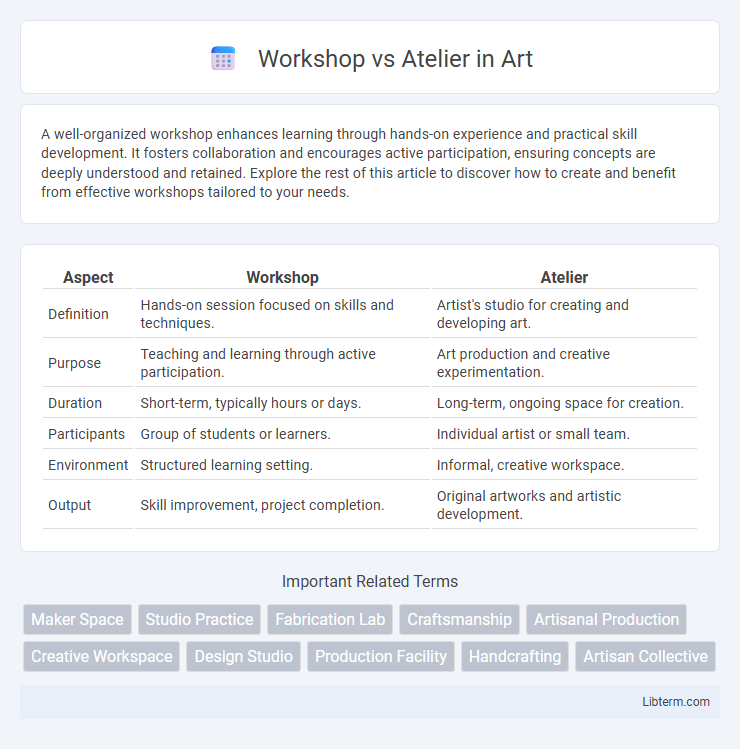A well-organized workshop enhances learning through hands-on experience and practical skill development. It fosters collaboration and encourages active participation, ensuring concepts are deeply understood and retained. Explore the rest of this article to discover how to create and benefit from effective workshops tailored to your needs.
Table of Comparison
| Aspect | Workshop | Atelier |
|---|---|---|
| Definition | Hands-on session focused on skills and techniques. | Artist's studio for creating and developing art. |
| Purpose | Teaching and learning through active participation. | Art production and creative experimentation. |
| Duration | Short-term, typically hours or days. | Long-term, ongoing space for creation. |
| Participants | Group of students or learners. | Individual artist or small team. |
| Environment | Structured learning setting. | Informal, creative workspace. |
| Output | Skill improvement, project completion. | Original artworks and artistic development. |
Defining Workshop and Atelier
A workshop is a structured, interactive session designed for learning, skill development, or collaboration, often involving practical activities and group participation. An atelier refers to an artist's or craftsman's studio where creative work is produced, emphasizing hands-on craftsmanship and artistic creation. Workshops prioritize education and skill acquisition, while ateliers focus on creative production within a dedicated workspace.
Historical Origins of Workshops and Ateliers
Workshops originated in medieval Europe as communal spaces where artisans and apprentices collaboratively crafted goods under a master's supervision, fostering skill transmission and craftsmanship. Ateliers emerged in the Renaissance period, particularly in France and Italy, as specialized studios for fine artists, emphasizing individual artistic development guided by a master artist. Both workshops and ateliers played crucial roles in shaping early artistic and technical education systems, reflecting distinct cultural approaches to craftsmanship and creativity.
Key Differences Between Workshop and Atelier
Workshops are often structured, time-bound sessions aimed at teaching specific skills or knowledge through hands-on activities and group interaction, while ateliers serve as creative studios where artists or craftsmen work on individual projects, emphasizing personal artistic development. Workshops prioritize learning outcomes and skill acquisition with a collaborative environment, whereas ateliers focus on continuous practice, mentorship, and refinement of technique in a more open-ended setting. The key difference lies in the purpose: workshops concentrate on education and skill-building, whereas ateliers foster artistic creation and mastery.
Creative Processes in Workshops vs Ateliers
Workshops foster collaborative creativity through structured, time-limited sessions designed to generate ideas and teach techniques, often emphasizing group interaction and experimentation. Ateliers, rooted in traditional artistic mastery, provide a continuous, immersive environment where artisans refine skills over time under expert guidance, emphasizing individual craftsmanship and deep material exploration. The creative process in workshops is dynamic and iterative, while ateliers focus on meticulous skill development and sustained artistic growth.
Tools and Equipment: Workshop vs Atelier
A workshop typically features heavy machinery, power tools, and industrial equipment designed for large-scale fabrication and repair tasks, ensuring efficiency and precision in production. An atelier, by contrast, emphasizes specialized hand tools, artisanal materials, and delicate instruments that facilitate fine craftsmanship and artistic creativity. The distinction in tools and equipment reflects the functional focus: workshops cater to mechanical or industrial processes, whereas ateliers prioritize detailed, handcrafted work.
Artistic Collaboration: Contrasts and Interactions
A workshop typically emphasizes structured artistic collaboration where participants engage in skill-building and guided creative processes, fostering a dynamic exchange of techniques and ideas. An atelier serves as a master artist's studio, prioritizing mentorship and continuous artistic development within a more intimate and personalized environment. Both formats facilitate creative interaction but differ in scale, formality, and focus on collaborative learning versus individualized artistic growth.
Spaces and Layout: Comparing Environments
Workshop spaces are typically designed for practical tasks, featuring sturdy workbenches, tool storage, and ample lighting to support hands-on activities such as carpentry or metalworking. Atelier environments prioritize artistic creation, often incorporating open floor plans, natural light from large windows, and flexible layouts to accommodate painting, sculpting, or design work. The spatial arrangement in workshops emphasizes efficiency and functionality, while ateliers focus on inspiring creativity and allowing for spatial freedom.
Types of Work Produced in Workshops and Ateliers
Workshops typically produce functional, mass-produced items such as furniture, tools, or mechanical parts, emphasizing efficiency and replication. Ateliers focus on artistic or bespoke creations like paintings, sculptures, and couture fashion, prioritizing craftsmanship and individuality. The distinction lies in workshops generating utilitarian goods, while ateliers cultivate unique, expressive works.
Educational and Professional Roles
Workshops typically emphasize interactive learning environments designed for skill development and practical training, catering to both students and professionals seeking hands-on experiences. Ateliers, historically rooted in artistic and craft traditions, function as specialized studios where master craftsmen or artists mentor apprentices in advanced techniques and creative processes. Educational roles in workshops often involve structured curricula and group activities, while ateliers prioritize personalized instruction and the cultivation of professional artistry and craftsmanship.
Choosing Between Workshop and Atelier
Choosing between a workshop and an atelier depends on the level of hands-on experience and creative freedom desired. Workshops emphasize collaborative learning and practical skill development, ideal for beginners or groups seeking structured instruction. Ateliers offer a more immersive environment with mentorship from master artists, suited for advanced students focused on refining techniques and producing original work.
Workshop Infographic

 libterm.com
libterm.com